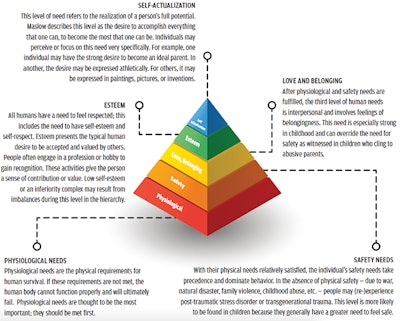
Over the past year, the Manufacturers Council has focused on the industry's inability to attract and retain good employees at the dealer level. Listening to these discussions led me to a moment of pause. After reflecting upon the dealers with whom I have enjoyed long-standing relationships, it occurred to me that they were now, or would soon be, entering the twilight of their careers. A look in the mirror further revealed that I no longer had a full head of hair, and that which remained atop my head was graying. Senior discounts at hotels and movie theatres are now available to me. To quote Bob Dylan, "Times they are a changin." Are we changing with them? Are we building an enduring legacy for our businesses, or spending too much time bemoaning how things used to be?
Those of us who have been in the pool business for decades love it. We cannot escape its allure. There are frustrations, to be sure. Nonetheless, these occasional hurdles do not outweigh the satisfaction derived from being part of an industry driven to create and maintain the ultimate backyard oasis. Not to mention the close friendships we have developed along the way. So why would anyone hesitate to join our ranks, to follow our footsteps?
Today's young workers operate on a different plane than we did when seeking a job. Do you remember when Pong and PAC-MAN were "wow" technologies? These games are now ancient history. Today's guys and gals have grown up in a world bursting with surreal game graphics. Texting has replaced the phone call as the preferred form of communication.
So how do we bridge the gap between an established industry and a generation of new employees who live in a world of immediate gratification? What of the scores of individuals who make up the generations in between? More importantly, once we find new blood, how can we keep it flowing throughout our businesses instead of bleeding out the door?
RELATED: How to Keep Employees Motivated
My quest for answers to these questions led me to review Maslow's hierarchy of needs. As a quick refresher, Abraham Maslow, the author of "A Theory in Human Motivation," broke
down human wants and needs into five categories, expressed in a pyramid diagram. The bottom portion of the pyramid represents the most basic motivating factors (food, shelter, warmth, safety, etc.). The pinnacle is where a state of enlightenment resides. These needs and wants are endemic to the genetic makeup of everyone, baby boomers to millennials. Thankfully, smartphones, apps and all the games in the world cannot displace these basic human truths.

Though this article is not a lesson in psychology, it is a reminder of what provides individuals with satisfaction in what they do. In turn, these needs will drive the success of a business fueled by employee feelings of accomplishment and worth. Wages are secondary motivators. This is because no matter how much money you pay someone, without a feeling of fulfillment, their performance will ultimately suffer, as will their interest in remaining in a job long-term.
Daniel Pink, author of the book "Drive," points out that the classic theory of the carrot and stick as a motivating tool is on the decline. If it really worked, he explains, more incentives in the form of bonuses, commissions or other perks would lead to greater success. In practice, however, this is not the dominant case.
Returning to Maslow's pyramid, the top three layers hold the keys to what we are looking for in our desire to attract new blood to our industry. In any dealership, there is likely to be a variety of ages and skill levels that form the hierarchy of the enterprise. For a business to succeed, this is essential. Without leaders and managers, chaos is sure to follow. However, having structural management in place does not ensure long-term vitality of a business. Vitality comes from a stable workforce where members are part of a team with a feeling of "belonging," as Maslow defines it. Achieving business strength comes from establishing an ever-evolving culture, forming the fertile ground from which growth, prosperity and longevity will sprout.
Defining the culture of your company is critical. In their bestselling book "Change the Culture, Change the Game," Roger Connors and Tom Smith stress the importance of an aligned business culture that is inclusive and focused on achieving defined goals. Simply put, the more a culture operates in unison, the greater the likelihood for success. This in turn encourages individual efforts and celebrates achievements.
How would you define the culture of your organization? Do you have well-recognized goals? Have you shared them with your employees? Does each person understand their individual role in achieving them? How would you express the culture of your company to a prospective employee in such a way that they would be eager to join you?
Take note: to have goals and share them with your employees does not define your culture. A culture is the underpinning beliefs that support everything your company does. So for example, you might have a culture of service, which would support ever-evolving ways to take care of your customers' pools. Outcrops of this culture could involve having employees focused on things like water chemistry, problem solving, communication and overall customer relations. Bear in mind that defining and integrating a culture can take years. The dividends that accrue from it are immeasurable.
RELATED: Millennials: Reaching the Generation We Need
Earlier in this article, I touched on millennials and their fascination with texting. In addition to that, they live in a world of social media. Here is one place that a young employee can contribute mightily to your organization.
A strong presence on social media can continuously raise the value of your business as an authority and the best place to buy pool products. Talking with younger people in your business about social media may well open up your eyes to opportunities you never envisioned. For them, it could be the perfect way of unlocking their passion for your business while building their self-esteem. Have you sat down with your younger employees lately and sought out their advice concerning how to build a strong, positive social media presence?
The pinnacle of Maslow's Pyramid is reached when an employee feels empowered to influence or make decisions. It is where he or she takes on a sense of ownership. They are operating for the good of the entire organization. Their focus is on building an enterprise that will endure. It is a place where they take pride in what they are doing.
Attracting, integrating and retaining employees starts with you. Step back from the canvas. If your business is successful, ask yourself what is driving it and how can you reinforce the culture. If you are frustrated at your inability to find and hold on to good people, sit down and write out why things are not working the way you would like. Stop reflecting on the "good old days." The best days lie ahead once you discover the tools necessary to change things. The acronym EMBRACE (see below) provides some guidelines to keep in mind.
EMBRACEEngage your employees in regular dialog to maintain a pulse on their attitudes |











































